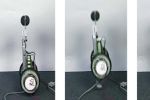The Unusual Suspects
Obesity is our century's version of the Kennedy assassination: Everybody's got a theory. But even with blame perpetually shifting -- one day it's fast-food corporations, the next it's genetics -- and a $40-billion-a-year diet industry, our waistlines just won't stop expanding.
The prevalent belief is that the problem is merely a matter of willpower. If we could only acquire some, the thinking goes, we'd be able to eat less, move more, and maintain a reasonable weight. It's a position backed by common sense, of course, but it's also the kind of oversimplification that could be the reason we're not coming up with any lasting solutions. "There's a sense about obesity that we already know all the answers," says David B. Allison, a biostatistician at the University of Alabama at Birmingham.
But in truth we're only just beginning to reveal them. Faced with a mounting collection of research implicating unconventional factors like viruses, pollutants and the amount of sleep we get, even the National Institutes of Health has begun to explore alternatives to traditionally held beliefs about weight gain. "We realize that obesity is more complex than we thought, so it's necessary to explore all possible theories," says Jerrold J. Heindel, the health science administrator for the National Institute of Environmental Health Sciences, a division of the NIH.
Weird as they may seem, the following hypotheses are quietly transforming the way we think about and treat obesity.
Artificial Sweeteners Make Us Fatter
THEORY
Sugar substitutes may blunt the brain's natural ability to measure calories, causing us to overeat.
EVIDENCE
On the surface, it makes sense that America's consumption of products made with no- or low-calorie sweeteners would increase at about the same rate as incidents of obesity -- after all, don't zero-calorie sweeteners go hand-in-hand with dieting? They do, but perhaps not in the way you might think. "Most people have assumed that as people gained weight, they increased consumption of artificial sweeteners," says neuroscientist Terry Davidson of Purdue University. "Our data suggests that [the cause and effect] could go the other way."
Davidson and his colleague, psychologist Susan Swithers, published their findings last February in the journal Behavioral Neuroscience. They fed rats either artificially sweetened yogurt or sugar-sweetened yogurt in addition to their normal rodent chow. The animals that ate artificially sweetened yogurt not only gained more weight, they also appeared to lose their natural ability to keep track of the extra calories and eat less later on.
"It's a Pavlovian approach to obesity," Davidson says. "Animals learn to use taste to predict caloric consequences, and in nature, sweetness is almost always an indicator of calories." When we experience a sweet taste with no accompanying caloric intake, it confuses that calibration tool. Repeating that experience, as in drinking a diet soda every afternoon, might actually deprogram your calorie-counting mechanism for good. (In the rats, effects were seen in as few as 10 days.)
FRINGE FACTOR
Moderate. Even skeptics admit that the evidence is compelling, but causality has yet to be proven in humans. And although rats have similar taste receptors as us, they have a more limited diet and don't respond to all sweeteners the same way as humans do. (The Purdue study focused on saccharine, one of five artificial sweeteners approved by the Food and Drug Administration and one that rats do register like us.)
NEXT STEPS
More study is needed.
3 Comments
Popular Tags
SciTech
Regular Features

Featured
SciTech
Science Confirms the Obvious 2008
The findings may be no-brainers (yes, you do get sick in winter), but these studies uncover hidden truths in conventional wisdomBuilding the Real Iron Man
While audiences flood theaters this month to see the comic-book-inspired Iron Man, a real-life mad genius toils in a secret mountain lab to make the mechanical superhuman more than just a fantasy with the XOS Exoskeleton
Popular on Popsci
Most Viewed
SciTech
- Hunting The Elusive Fat Pill
- The Secret of Successful Kissing
- I Don't Know But I Been Told
- HIV Resistance Through Oral Sex?
- The Science of Snobbery
- Ladies and gentlemen, the Reebok Pump is Back on the Scene! Well, Sort Of
- You Want to Put What Where?
- Puzzling Together Human Origins
- Oh, Mama Mia!
- Dormant Supercollider Generates Star Power
Most Commented
SciTech
- High Speed Rail Link to Make Canberra Sydney’s Second Airport
- Oh, Mama Mia!
- Tilt Train Technology
- Bigger Balls - PopSci Investigates Tennis
- Listen up!
- The Unusual Suspects
- Stay Healthy or Go Blind!
- Gym Won't Make Up for Sitting Around
- Atlantis Found on Google Earth, Official Explanation Is Dubious
- Enzyme Cleans Up Pesticide
Most Emailed
SciTech
- Hunting The Elusive Fat Pill
- So, Do You Really Want to Know?
- Ladies and gentlemen, the Reebok Pump is Back on the Scene! Well, Sort Of
- The Secret of Successful Kissing
- Just How Fat Are We?
- Selected Science Stories Are Silly
- Gym Won't Make Up for Sitting Around
- Hamster Power
- Listen up!
- Atlantis Found on Google Earth, Official Explanation Is Dubious









Comments
I already knew about the dangers of artificial sweetners and how they are actually worse for your body than sugar, and microwave ovens make sense because generally the food you get is pretty much like fast food with little nutritional value and a lot of artificial preservatives. The air-conditioning theory is pretty bizarre, along with the ear infection one!
I'm still a firm believer in a steady diet and exercise to maintain weight and stay healthy, as its been working for me for several years now. But I guess everyone is different.
0 out of 0 people found this comment helpfulI actually believe that losing sleep may make you gain weight, since the times I stay up late are the times I snack the most! I was thinking lately that if I went to bed earlier, I'd be skipping the midnight snacking and would probably be better off for it.
The virus thing I don't buy though, despite the growing credibility of it. Its hard to imagine a virus which causes you to get fatter all of a sudden, and permamently as well! There must be another cause for it...
0 out of 0 people found this comment helpfulIn terms of the virus, if it attacked something in the brain which controlled your 'hunger factor' I guess, I suppose I could buy that story.
I believe a certain degree comes with hereditary factors, particularly your bone structure (some people are naturally larger). Of course, if there is heaps of food in the house all the time, because your parents are big eaters, then there's a damn good chance kids will get bigger too.
There's a guy in my area who is literally the size of three or four medium build people standing side by side. I've seen his kids, and they're pretty big too
0 out of 0 people found this comment helpful